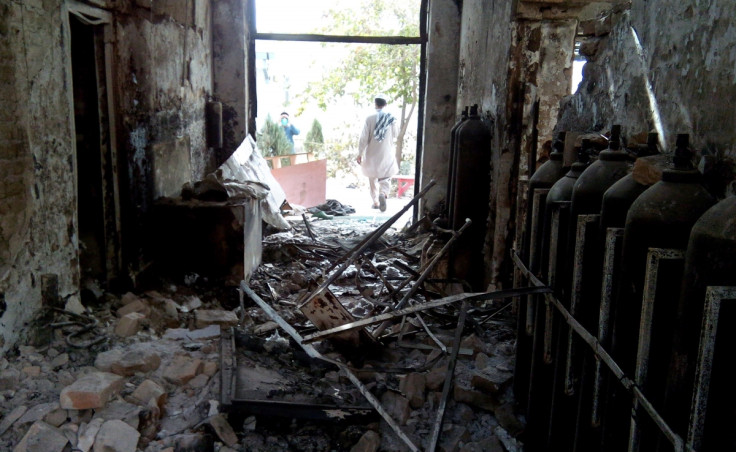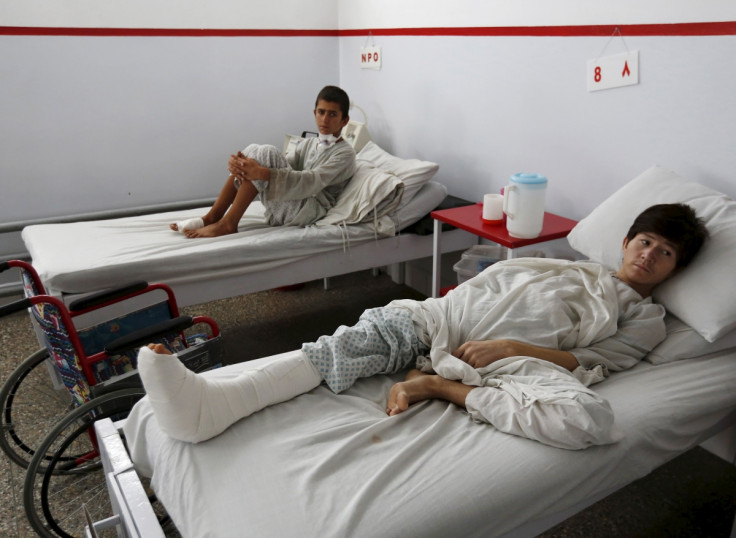Kunduz bombing: MSF staff shot by US planes while fleeing hospital

Medecins Sans Frontieres (MSF) has released chilling details about the US bombing of the charity's hospital in Kunduz, Afghanistan, with tales of patients burning in their beds, medical staff decapitated or shot by circling AC-130 gunship planes while fleeing the burning building.
An initial internal review of the air strikes on 3 October, which killed at least 30 MSF staff and patients, shows that the hospital was "fully functioning" and there was no heavy fighting from both sides in the vicinity of the compound before the attack.
"For the first time in days our team in Kunduz was standing outside in the open ground of the hospital. Before they were afraid of stray bullets," said MSF's Christopher Stokes at a press conference. "The team even performed surgical interventions on the day of the bombing." The staff placed two MSF flags on the roof of the hospital, in addition to the existing flag that was being flown at the entrance of the trauma centre.
The medical group said it repeatedly gave the GPS location of the "well-known" hospital in Kunduz to the US Department of Defense, the Afghan Ministry of Interior and Defense and US Army in Kabul. All the parties assured that the coordinates had been passed on to the appropriate parties.
As the fighting intensified, the hospital started treating more Taliban patients, who were nonetheless asked to leave their weapons at the gates of the compound. "That is a normal procedure that MSF adopted when we negotiated the return to Afghanistan," MSF said. "We accept wounded of all sides on conditions that they leave their weapons at the gates."

At the time of the bombing there were fewer than 20 Taliban and five Afghan army patients, lying in their hospital beds.
The group received an inquiry from a US government official in Washington asking whether the hospital had a large number of Taliban personnel "holed up". The MSF replied that staff was working "at full capacity" and the hospital was full of patients from all sides.
The group dismissed later allegations that the Kunduz compound was a "Taliban base" hosting 300 Taliban combatants with weapons as "ridiculous".
A UN civilian/military liaison officer advised people to stay put within the GPS coordinates provided as bombing was ongoing to Kunduz.
Survivors of the US airstrikes recounted horrific details of the scene. Patients at the intensive care unit (ICU) "burned in their beds" as MSF staff attending those patients who were directly hit.
#Kunduz First room to be hit was ICU where patients were immobile. They burned in their bed https://t.co/TA59r6uCP8 pic.twitter.com/yAh4FKfTlT
— MSF International (@MSF) November 5, 2015Raids then continued from the east to the west end of the main hospital building, flattering the ICU, archive, laboratory, ER, mental health and other theatres.

An MSF nurse arrived to the administrative building "covered from head to toe in debris and blood with his left arm hanging from a small piece of tissue after having suffered a traumatic amputation in the blast".
MSF staff made several distress calls to both US and Afghan officials while the facility was being bombed. The initial call was placed at 2.19 am. At 2.52 am, a reply from Resolute Support was received, saying, "I'm sorry to hear that, I still do not know what happened."
The hospital staff sent another message, insisting the strikes stop, and were told: "I'll do my best, praying for you all".
Fleeing staff and patients were shot probably from AC-130 planes, which followed the movement of people on the run. A patient in a wheelchair attempting to escape from the department was killed by shrapnel from a blast. One MSF staff was decapitated by shrapnel and another doctor suffered a "traumatic amputation to the leg in one of the blast".
The bombing ceased at around 3.15am.
"The attack on our hospital in Kunduz destroyed our ability to treat patients at a time when we were needed the most. We need a clear commitment that the act of providing medical care will never make us a target. We need to know whether the rules of war still apply," said Joanne Liu, MSF international president.
The Pentagon said a preliminary investigation of the episode would be completed soon. The Afghan government also pledged to investigate the air strike.
But MSF has called for an independent investigation into the event:
We don’t have view from cockpit or from within the Afghan & US chain of command. We need a #IndependentInvestigation https://t.co/TA59r6uCP8
— MSF International (@MSF) November 5, 2015The full report can be found here.
© Copyright IBTimes 2025. All rights reserved.





















